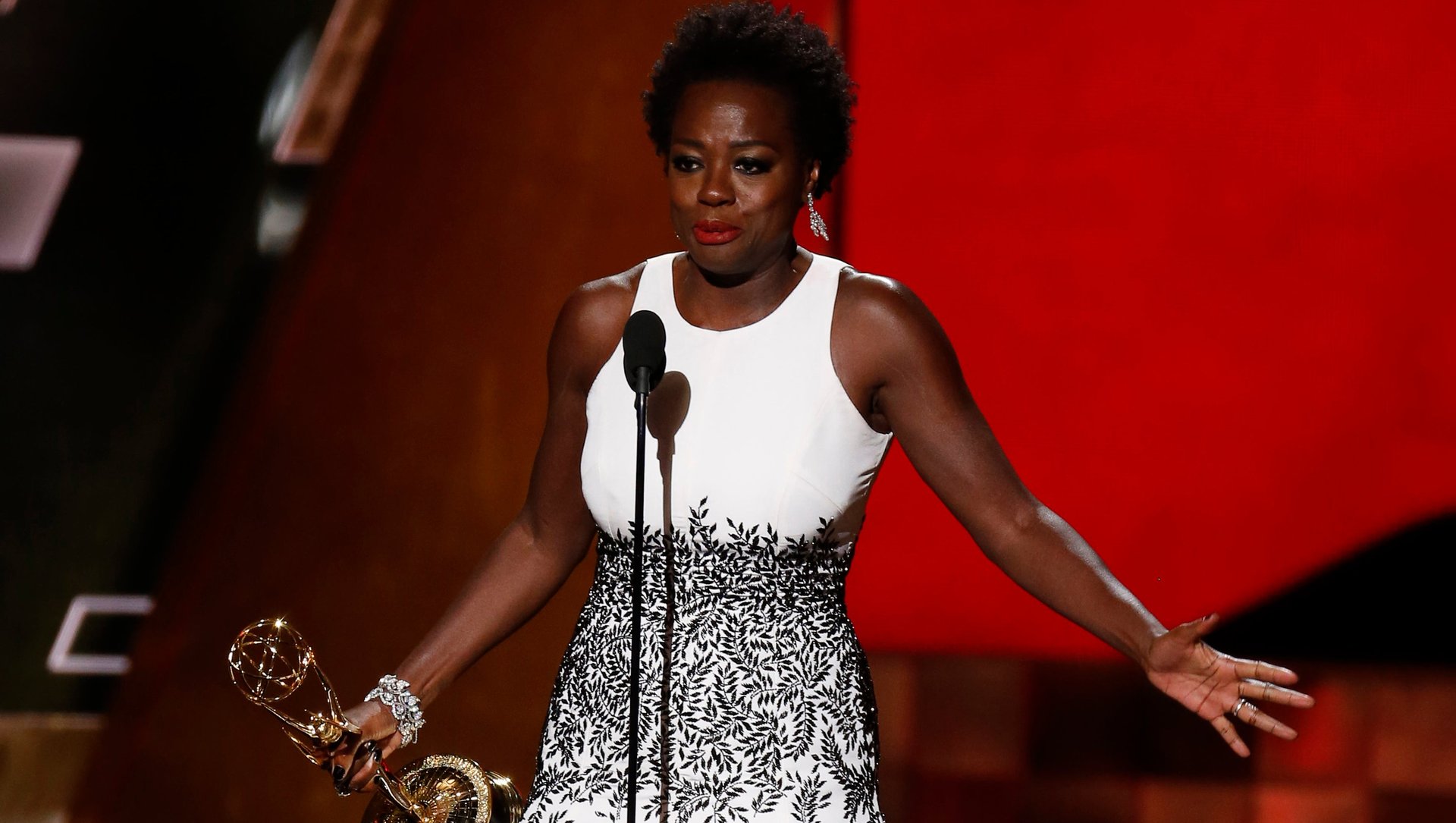Hollywood’s come a long way, baby—but it’s definitely not a meritocracy
The 67th Primetime Emmy Awards were remarkably progressive, and not just because organizers apparently decided spoiler warnings are an antiquated tradition. Viola Davis made history as the first black woman to ever win an Emmy for lead actress in a drama series thanks to her work on How To Get Away With Murder. Elsewhere, Uzo Aduba and Regina King picked up statues for their Orange Is The New Black and American Crime roles, respectively; the female-fronted HBO miniseries Olive Kitteridge proved to be a veritable Emmys magnet; and Transparent was lauded for its exploration of the transgender community. In his opening monologue, Samberg celebrated the fact that this was the most diverse group of nominees in Emmy history—before joking that the bar was set pretty low.


The 67th Primetime Emmy Awards were remarkably progressive, and not just because organizers apparently decided spoiler warnings are an antiquated tradition. Viola Davis made history as the first black woman to ever win an Emmy for lead actress in a drama series thanks to her work on How To Get Away With Murder. Elsewhere, Uzo Aduba and Regina King picked up statues for their Orange Is The New Black and American Crime roles, respectively; the female-fronted HBO miniseries Olive Kitteridge proved to be a veritable Emmys magnet; and Transparent was lauded for its exploration of the transgender community. In his opening monologue, Samberg celebrated the fact that this was the most diverse group of nominees in Emmy history—before joking that the bar was set pretty low.
Yet for all of its diversity in the acting categories, the rest of the show was all too familiar. According to the Women’s Media Center, women made up just 25% of the writing, directing, producing, and editing nominees this year. This isn’t an anomaly—it’s a longstanding Emmys tradition. Over the past decade, women have accounted for just 22% of the nominees in those categories (that’s 7,485 men to 2,074 women). In 67 years, only a handful of black directors have been nominated for Emmy awards. The representation picture looks worse when you look at Asian American, Latino, and Native American directors, producers and creators.
This isn’t a failing of the Emmys committee, of course, but reflective of a larger diversity gap in mainstream American television. In its 2014 Hollywood Diversity report, the Ralph J. Bunche Center for African American Studies at UCLA noted minorities were “underrepresented by a factor of nearly 9 to 1 among creators of broadcast comedies and dramas” for the 2011-2012 season, and struggled to find directing gigs for either broadcast or cable programs.
The disparity between this year’s relatively-diverse acting nominees and its far-less diverse creative ones immediately calls to mind Matt Damon’s controversial claim that diversity should be a consideration during casting, not during behind-the-scenes hiring. If anything, the 2015 Emmys prove Damon’s logic is fundamentally faulty: behind-the-scenes and onscreen diversity are deeply intertwined.
After all, Davis earned her historic win for starring on a show that was launched largely thanks to the name recognition of its executive producer Shonda Rhimes, a black woman who created the first network drama to feature a black female lead since the 1970s. King, meanwhile, won for her work on American Crime, a show created by John Ridley, another black showrunner. Aduba rose to fame on a Netflix series created by female showrunner Jenji Kohan. And the much-lauded Olive Kitteridge was written and directed by two women—Jane Anderson and Lisa Cholodenko—who both picked up Emmys for their work on the series.
White male creators, of course, can and do create shows with diverse characters—Veep for instance, is a fantastic female-fronted comedy created by a group of men. But diverse creators offer new storytelling perspectives, which in turn provide new casting opportunities.
And that’s why last night’s Emmys were simultaneously exhilarating and frustrating. It was great to see Jill Soloway’s much-deserved win for comedy directing on Transparent, but also disappointing that the writing and directing categories averaged only one or two female nominees apiece. And Inside Amy Schumer’s win for a variety sketch series was tempered a bit by the reminder that variety series staff writers are still remarkably male-centric. The Colbert Report, for instance, listed 15 men and only one woman on its staff.
Statistics suggest film school graduates are a diverse bunch (at least when it comes to gender), so why don’t they all rise to the top of their field with the same regularity? Two of last night’s speeches might be the key to understanding that problem.
After quoting Harriet Tubman in her stunning acceptance speech, Davis explained, “The only thing that separates women of color from anyone else is opportunity. You cannot win an Emmy for roles that are simply not there.” Meanwhile in their speech for best drama writing, Game Of Thrones showrunners D.B. Weiss and David Benioff thanked HBO for “taking a chance on two schmucks with no experience.”
It’s a startlingly juxtaposition of two very different perspectives. And it’s something that Matt Damon—or anyone else who’s still under the mistaken impression that Hollywood is a meritocracy—will hopefully keep in mind in the future.